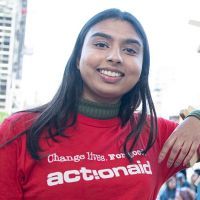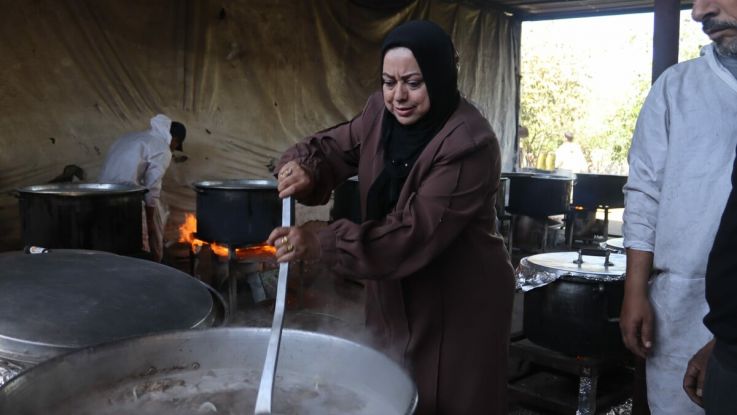Why I joined the People’s Banquet to stand up to President Trump
10 June 2019
As the UK hosted President Trump on a state visit, ActionAid joined the People's Banquet to oppose the roll back of women's rights. Find out why Ria, an ActionAid campaigner, was determined to stand up against Trump.

actionaid. Photo: ActionAid
Last week the UK rolled out the red carpet for President Trump by honouring him with a state visit. I didn’t want the President’s shameful record on women’s rights to go unnoticed, so while Mr Trump sat down to a State Banquet with the Queen, I decided to join the People’s Banquet with ActionAid and the Women’s Peace Council.
Why I joined
As a community campaigner with ActionAid, I know how important it is to speak out on women and girls’ rights.
So while leaders like Mr Trump, who peddle misogyny and division, are welcomed to the UK with open arms, I see it as my duty to resist these harmful values.
That’s why I decided to join ActionAid and the Women’s Peace Council at the People’s Banquet in Parliament Square.
The People's Banquet
The People’s Banquet was a peaceful coming together of diverse groups who wanted to take a stand against misogyny and division.
We did this by sharing messages of solidarity and justice, singing songs together, breaking bread and talking about the value of women’s rights activism.
My favourite part of the evening was making a speech about the courageous women who inspire me and the vital importance of feminist solidarity across ages, backgrounds, nationalities and genders.
It was my first time talking on a podium at a rally, but judging from the applause and comments afterwards, it went really well. This was despite the lack of time I had to prepare - I had to sit an A-Level exam in the morning!
I stood alongside other speakers from equality and human rights groups, as well as Jewish, Muslim and Christian faith leaders, but was definitely the youngest activist to take to the stage.
I think this just goes to show how much potential we all have to stand up and speak out on women’s rights.

ActionAid campaigners at the People's Banquet - with white flowers of peace .
The roll-back of women’s rights
It felt especially important to raise my voice at a time when Mr Trump and other leaders’ regressive policies are affecting so many women’s rights and freedoms across the world.
From the US to the Global South, a new wave of misogynistic rhetoric and policy-making is damaging women’s lives and whole communities across the world.
Last year for example we saw Brett Kavanaugh sworn in as a US Supreme Court justice, despite allegations of sexual assault.
The woman who testified against him - Dr Christine Blasey Ford - had her testimony mocked and dismissed by President Trump.
Then, just a month later, we saw a man acquitted of rape in Ireland after the survivor’s underwear was shown in court1 .
Despite the progress made since #MeToo, these cases demonstrate how survivors’ voices are still very much marginalised by those administering justice.
My body is mine
No woman should lose the right to make choices over her own body, but this is exactly what the US’s global gag rule, expanded under Mr Trump, has meant for thousands of women in the Global South.
It has meant that ‘gagged’ organisations cannot provide information on sexual health, contraception or safe abortions.
A recent report2 has confirmed the harmful and sometimes fatal impact this has had on women and other marginalised groups’ lives across the world.
It’s not just President Trump
We know, however, that Mr Trump is not alone in rolling back progress on women’s rights.
Earlier this year, the US joined forces with other nations in attempts to undermine global agreements on women’s rights.
During fortnight-long discussions over the 1995 Beijing Declaration, for example - a touchstone agreement for those fighting to end violence against women and girls - the US aligned itself with Saudi Arabia and Bahrain in calling for references to gender to be removed.
This just goes to show how decades of progress on gender equality can be jeopardised in a matter of weeks. These kinds of decisions can impact all of us.

Fellow campaigners at the People's Banquet .
Feminist activism across borders
UN declarations and national policy agreements may at first seem distant from our everyday lives, but they really do impact us every single day, from the UK and US to Nigeria and Nepal.
That’s why the campaigning we do at ActionAid is so important – it’s about coming together across borders to demand a world where survivors can access justice, no matter their background or means.
This year, for example, we’re working with activists from Ghana and Jordan to call for power to be put back in the hands of women and girls who’ve survived violence.
Our campaign is about more than just ensuring cases are heard in court – it’s also about ensuring survivors can access healthcare, legal aid and long-term support in the aftermath of violence.
We want to make sure that every survivor’s story counts, and that their truth is answered with action.
Community campaigning
As a community campaigner with ActionAid, I put this campaign mission into action by working with local groups in the UK to strengthen feminist awareness, skills and solidarity across borders. I believe that the more empowered we feel to talk about our own experiences of oppression and injustice, the more we can help to amplify the voices of others – including survivors in the Global South.
It takes courage and collaboration, but I believe we all have the potential to create change.
Will you sign up to join me, and become a community campaigner?



